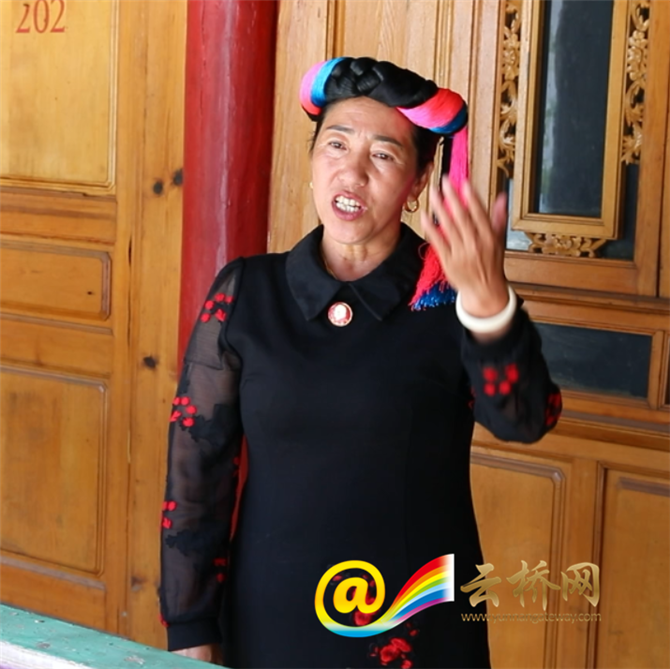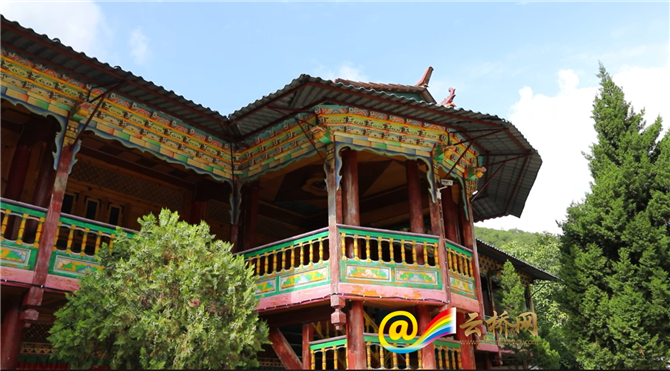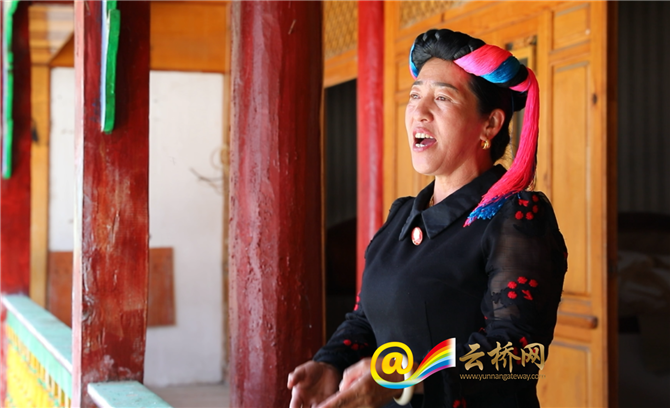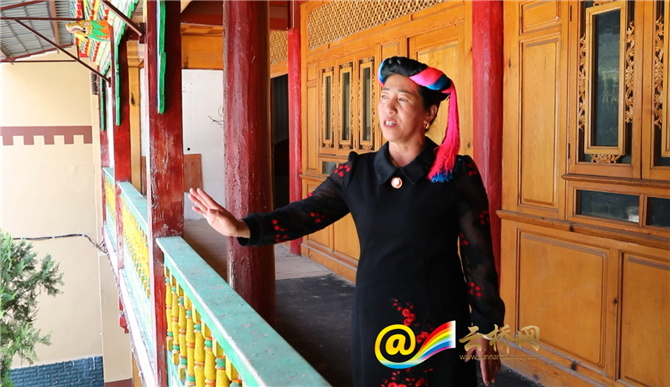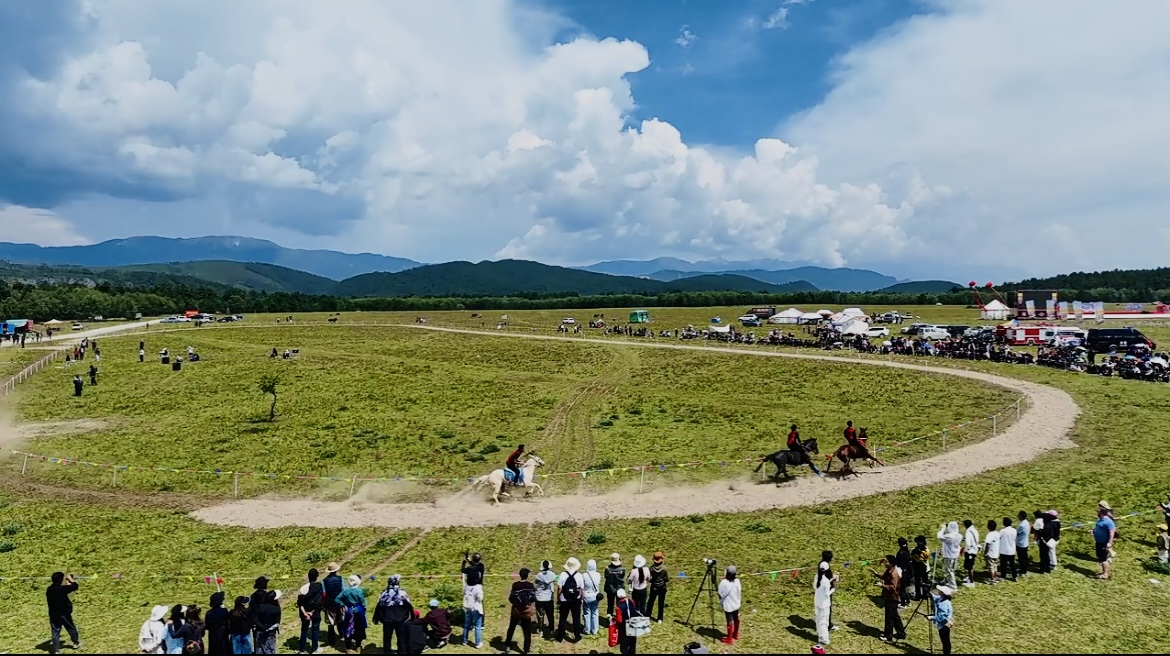|
“你的头发为何梳一半不梳一半,你的脸为何洗一半不洗一半,你的手为何白一半黑一半?”……53岁的和金梅面朝太阳肃穆而立,歌声遏云绕梁,婉转处催人泪下。每次当她唱起这首藏族伟大的史诗《格萨尔王传》,总能让听者为之动容,无论是当地人还是过客。 “Why is your hair half-combed, why is your face half-washed, and why do you have black and white hands?” The 53-year-old He Jinmei was singing beautifully, facing the sun and standing squarely. Whenever she sang the Epic of King Gesar, the listeners would be visibly moved, be it a native or a visitor from afar. 《格萨尔王传》是藏族的鸿篇史诗。在漫长的历史中,这部史诗一直以口口相传的方式在藏地广泛流传,并逐渐艺术化,形成了独特的“说唱”表演和传播形式。但让人遗憾的是,如今在迪庆,格萨尔说唱已成重度濒危的非物质文化遗产,能够说唱格萨尔的传承人已经不多了。 The Epic of King Gesar is one of the world's great epics, as significant for Tibetans as the Odyssey and Iliad for the ancient Greeks. In history, the epic used to be widely spread in Tibetan regions from mouth to mouth. But now the epic has become an endangered cultural heritage in northwest Yunnan’s Diqing Tibetan Autonomous Prefecture, and only a few inheritors can sing King Gesar.
“从14岁接触格萨尔说唱,我就被这个故事打动,并深深爱上了它。此后几十年,我一直跟着阿佬学唱格萨尔,现在已经能把52段全部唱完了。在塔城,在迪庆,我可是除了阿佬之外唯一一个能唱完的人了。我会一直唱下去,让格萨尔的故事代代相传。”说到动情处,和金梅美丽的眼睛笑成了弯月亮。和金梅口中的“阿佬”,就是世界级非物质文化遗产项目格萨(斯)尔的国家级代表性传承人和明远。他既是和金梅的老师,更是和金梅信任和依赖的长辈。 “At the age of 14, I began to sing King Gesar. The story moved me a lot and I fell in love with it. For decades, I’ve been learning the epic from the master, and now I can sing all 52 episodes." He Jinmei said passionately, smiling. "In Diqing, I am the only one who can sing the full epic in addition to my master. I’ll go on singing so that the King’s story can be passed down from generation to generation,” she added. Jinmei’s master is He Mingyuan, national inheritor of the world-class intangible cultural heritage project of King Gesar. For Jinmei, Mingyuan is both her teacher and a senior whom she trusts and relies on.
14岁时的一次集体劳动,让和金梅与格萨尔说唱结下了一生的缘。劳动之余,大人们跳起锅庄,刚刚初中毕业的和金梅则缠着和明远讲故事。和明远年轻时曾在寺院中学习藏文并习得了格萨尔说唱的曲调,那个下午,格萨尔的故事就随着和明远的讲述和唱颂深深刻在了和金梅的心中。悠扬深沉的曲调,让被称为“塔城百灵鸟”的和金梅沉浸其中不能自拔。“我要跟你学!”少女和金梅激动地拉着和明远的手要求。“按咱们藏族的说法,唱这个生活会很艰难的哦!”和明远认真地问。“我不怕!”和金梅坚定地答。“那好,我教你。”和明远也郑重承诺。这一教一学,就是近40年。和明远的吟唱从此不再孤单,师徒二人的格萨尔对唱,将英雄的故事传到塔城及周边。 A collective farming allowed He Jinmei to forge a life-long relation to the epic. Having done the labor, the adults relaxed themselves via the Guozhuang dancing, while Jinmei, who just graduated from junior high school, nagged Mingyuan to tell her stories. Mingyuan had studied Tibetan in the monastery and picked up some tunes in the epic. That afternoon, He Jinmei instantly fell in love with the melodies and King Gesar’s story was engraved at Jinmei’s heart. “I want to learn from you!” said Jinmei begging Mingyuan. Back then, the 14-year-old girl was nicknamed a “lark of Tacheng.” “But you should understand singing the epic means you have to live a poor life,” Mingyuan told her seriously. “I don’t care,” replied Jinmei firmly. “That's good, and then I’ll teach you,” promised Mingyuan. In the ensuing 40 years, Mingyuan’s epic singing has been followed by Jinmei’s clear, high voice, and their antiphonal singing spread the King’s story aross Tacheng and its nearby villages. 一曲唱完,不仅我们深深着迷,连旁边的藏族小伙子也听呆了:“我还是第一次听格萨尔说唱,太美了!”和金梅笑了:“我们当地听过格萨尔说唱的藏族群众越来越少了,所以我着急得很。阿佬现在70多岁了,身体不太好,我只有天天缠着他,尽可能多学点学好点。”“难学吗?”记者问。“太难学了!我很聪明的,电视剧的歌看两遍就会。可是格萨尔说唱,需要很多遍才能学会记住。” 格萨尔说唱没有歌谱传世,全靠人们的记忆传承。所以,不敢错不能错,是对传承人的基本要求。 A tune came to an end. The audiences, including a Tibetan young man, were deeply fascinated. “It’s my first time to listen to the epic, so beautiful!” said the young man. Jinmei smiled: “Fewer and fewer Local Tibetans listened to King Gesar’s epic, so I am quite anxious. The master is now in his 70s, and he isn’t in good health. I’m still nagging, trying to learn from him as much as possible.” “Is it easy to learn the epic?” one listener asked. “No! Very hard. I was smart in singing, and I picked up songs on TV that was played once or twice. But for the epic tunes, it took me many times to learn a single tune.” The King Gesar epic has no written musical notes, and the singer has to learn the melodies all by heart. As an inheritor, it is essential to make no mistake. Mistakes are taboo.
一项技艺的传承不仅靠喜爱,更要靠坚持。为了学好学全,和金梅几乎把所有的休息时间都用上了。向老师一句一句地请教,回家一段一段背诵。“我学了那么多年,直到最近几年,才把阿佬掌握的十多个唱腔、50余段故事全部学会。”看着旁边跳得热火朝天的热巴,和金梅颇有个性地说:“塔城的藏族都爱跳热巴,我以前也爱,还是维西县级非物质文化遗产项目塔城热巴舞代表性传承人呢!可现在,我就独爱格萨尔说唱,我要成为格萨尔说唱的传承人!”阳光穿过碧蓝的天空,铺洒在色彩对比鲜明的藏式木楼前,让人看到了塔城文化最艳丽最炽热的一面。 To learn the epic, Jinmei almost devoted all her leisure time. “Over the past decades, I have been singing, but finished it only in recent years. The epic covers more than 50 episodes in ten plus tunes, said Jinmei.At the lively Reba dancing nearby, He Jinmei recalled she used to be good at the dancing like most Tibetans in Tacheng, but now what she want to do is to be the inheritor of the King Gesar epic. In the sun shines and under the blue sky, the dancing and singing formed a marvelous picture of Tacheng’s local culture in front of the Tibetan wooden houses.
为了保护格萨尔说唱这项重度濒危非遗,当地想了很多办法。除了和金梅,和明远也在对自己的子孙辈口传心授,希望能有更多的人掌握这项传统的艺术。而作为塔城村委会的妇女主任,和金梅也会在各种场合推广格萨尔说唱。“来,让我给你们唱一个伟大英雄的故事吧!”已成为和金梅在村级活动结束后的“口头禅”。 To save this heavily-endangered art, He Jinmei and He Mingyuan are now teaching their own offspring, trying to get more people engaged in tradition. As women’s director of the Tacheng Village Committee, He Jinmei even promotes the epic in public. “Come on! Let me sing you a heroic story.” Jinmei often says at the end of villagers’ meetings. “给我准备一顶黄色的狐狸帽,给我准备一个象牙的板指,给我准备一双氆氇做的乌拉靴……”看周围的人们都沉醉于这意味悠长的吟唱,格萨尔说唱的传承之火定不会熄灭。 “Give me a yellow fox cap, give me a thumb ring made of ivory, and give me a pair of boots with Tibetan wool...” He Jinmei continued her singing. 云南日报全媒体记者 张若谷 熊燕 储东华 李文君 英文编译 王世学 |
【文化迪庆有传人】和金梅说唱格萨尔:塔城百灵鸟的此生最爱
来源:香格里拉网 作者: 发布时间:2018-09-17 16:32:25

频道精选
- 2024 年迪庆州新闻系列综合高级职称定向评审通过人员名单公示2024-09-05
- 香格里拉景区直通车:便捷出行,一站直达美景2024-09-05
- 香格里拉景区直通车:便捷出行,一站直达美景2024-09-05
- 张卫东到迪庆交通运输集团公司开展调研2024-09-05
- 福彩代销者:增强责任意识 倡导理性购彩2024-09-04
- 中央专项彩票公益金的用途及作用|下篇2024-09-04
- 中央专项彩票公益金的用途及作用|中篇2024-09-04
- 中央专项彩票公益金的用途及作用|上篇2024-09-04
- @迪庆人,这场活动需要您的参与!2024-09-04
- 积极参与2024年“99公益日·助力迪庆见义勇为”宣传募捐活动倡议书2024-09-04
